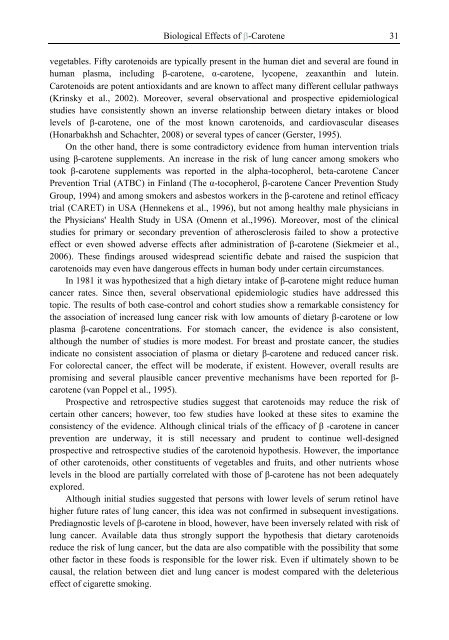Medicinal Plants Classification Biosynthesis and ... - Index of
Medicinal Plants Classification Biosynthesis and ... - Index of
Medicinal Plants Classification Biosynthesis and ... - Index of
Create successful ePaper yourself
Turn your PDF publications into a flip-book with our unique Google optimized e-Paper software.
Biological Effects <strong>of</strong> -Carotene<br />
vegetables. Fifty carotenoids are typically present in the human diet <strong>and</strong> several are found in<br />
human plasma, including β-carotene, �-carotene, lycopene, zeaxanthin <strong>and</strong> lutein.<br />
Carotenoids are potent antioxidants <strong>and</strong> are known to affect many different cellular pathways<br />
(Krinsky et al., 2002). Moreover, several observational <strong>and</strong> prospective epidemiological<br />
studies have consistently shown an inverse relationship between dietary intakes or blood<br />
levels <strong>of</strong> β-carotene, one <strong>of</strong> the most known carotenoids, <strong>and</strong> cardiovascular diseases<br />
(Honarbakhsh <strong>and</strong> Schachter, 2008) or several types <strong>of</strong> cancer (Gerster, 1995).<br />
On the other h<strong>and</strong>, there is some contradictory evidence from human intervention trials<br />
using β-carotene supplements. An increase in the risk <strong>of</strong> lung cancer among smokers who<br />
took β-carotene supplements was reported in the alpha-tocopherol, beta-carotene Cancer<br />
Prevention Trial (ATBC) in Finl<strong>and</strong> (The �-tocopherol, β-carotene Cancer Prevention Study<br />
Group, 1994) <strong>and</strong> among smokers <strong>and</strong> asbestos workers in the β-carotene <strong>and</strong> retinol efficacy<br />
trial (CARET) in USA (Hennekens et al., 1996), but not among healthy male physicians in<br />
the Physicians' Health Study in USA (Omenn et al.,1996). Moreover, most <strong>of</strong> the clinical<br />
studies for primary or secondary prevention <strong>of</strong> atherosclerosis failed to show a protective<br />
effect or even showed adverse effects after administration <strong>of</strong> β-carotene (Siekmeier et al.,<br />
2006). These findings aroused widespread scientific debate <strong>and</strong> raised the suspicion that<br />
carotenoids may even have dangerous effects in human body under certain circumstances.<br />
In 1981 it was hypothesized that a high dietary intake <strong>of</strong> β-carotene might reduce human<br />
cancer rates. Since then, several observational epidemiologic studies have addressed this<br />
topic. The results <strong>of</strong> both case-control <strong>and</strong> cohort studies show a remarkable consistency for<br />
the association <strong>of</strong> increased lung cancer risk with low amounts <strong>of</strong> dietary β-carotene or low<br />
plasma β-carotene concentrations. For stomach cancer, the evidence is also consistent,<br />
although the number <strong>of</strong> studies is more modest. For breast <strong>and</strong> prostate cancer, the studies<br />
indicate no consistent association <strong>of</strong> plasma or dietary β-carotene <strong>and</strong> reduced cancer risk.<br />
For colorectal cancer, the effect will be moderate, if existent. However, overall results are<br />
promising <strong>and</strong> several plausible cancer preventive mechanisms have been reported for βcarotene<br />
(van Poppel et al., 1995).<br />
Prospective <strong>and</strong> retrospective studies suggest that carotenoids may reduce the risk <strong>of</strong><br />
certain other cancers; however, too few studies have looked at these sites to examine the<br />
consistency <strong>of</strong> the evidence. Although clinical trials <strong>of</strong> the efficacy <strong>of</strong> β -carotene in cancer<br />
prevention are underway, it is still necessary <strong>and</strong> prudent to continue well-designed<br />
prospective <strong>and</strong> retrospective studies <strong>of</strong> the carotenoid hypothesis. However, the importance<br />
<strong>of</strong> other carotenoids, other constituents <strong>of</strong> vegetables <strong>and</strong> fruits, <strong>and</strong> other nutrients whose<br />
levels in the blood are partially correlated with those <strong>of</strong> β-carotene has not been adequately<br />
explored.<br />
Although initial studies suggested that persons with lower levels <strong>of</strong> serum retinol have<br />
higher future rates <strong>of</strong> lung cancer, this idea was not confirmed in subsequent investigations.<br />
Prediagnostic levels <strong>of</strong> β-carotene in blood, however, have been inversely related with risk <strong>of</strong><br />
lung cancer. Available data thus strongly support the hypothesis that dietary carotenoids<br />
reduce the risk <strong>of</strong> lung cancer, but the data are also compatible with the possibility that some<br />
other factor in these foods is responsible for the lower risk. Even if ultimately shown to be<br />
causal, the relation between diet <strong>and</strong> lung cancer is modest compared with the deleterious<br />
effect <strong>of</strong> cigarette smoking.<br />
31


